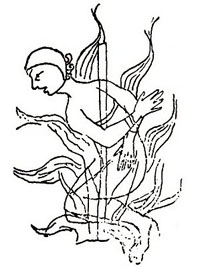The following text is an English translation of an extract from Bernard GUI'sPractica inquisitionis heretice pravitatis or "Conduct of the Inquisition into Heretical Wickedness". Gui [d.1331] was Inquisitor in Toulouse from 1307 to 1323. Here he describes the techniques used in interrogations.
This translation is from J. H. Robinson, Readings in European History, (Boston: Ginn, 1905), pp. 381-383. Other extracts concerning the examination of suspected Cathars are cited elsewhere on this website.
This extract is interesting as a relatively objective account of Cathar beliefs, with little accompanying polemic.
|
It would take too long to describe in detail the manner in which these same Manichaean heretics preach and teach their followers, but it must be briefly considered here. |
Medieval writers often refer to Cathars as Manichaean, as they were familiar with the Manichaean religion, which they regarded as a heresy, from the writings of St Augustine - who had himself been a Manichaean. Here the word Manichaean is best read as "Gnostic Dualist". | |
|
In the first place, they usually say of themselves that they are good Christians, who do not swear, or lie, or speak evil of others; that they do not kill any man or animal, nor anything having the breath of life, and that they hold the faith of the Lord Jesus Christ and his gospel as the apostles taught. They assert that they occupy the place of the apostles, and that, on account of the above-mentioned things, they of the Roman Church, namely the prelates, clerks, and monks, and especially the Inquisitors of heresy persecute them and call them heretics, although they are good men and good Christians, and that they are persecuted just as Christ and his apostles were by the Pharisees. |
This is also correct. | |
|
Moreover they talk to the laity of the evil lives of the clerks and prelates of the Roman Church, pointing out and setting forth their pride, cupidity, avarice, and uncleanness of life, and such other evils as they know. They invoke with their own interpretation and according to their abilities the authority of the Gospels and the Epistles against the condition of the prelates, churchmen, and monks, whom they call Pharisees and false prophets, who say, but do no. |
This is also correct. | |
|
Then they attack and vituperate, in turn, all the sacraments of the Church, especially the sacrament of the Eucharist, saying that it cannot contain the body of Christ, for had this been as great as the largest mountain Christians would have entirely consumed it before this. They assert that the host comes from straw, that it passes through the tails of horses, to wit, when the flour is cleaned by a sieve (of horse hair); that, moreover, it passes through the body and comes to a vile end, which, they say, could not happen if God were in it. |
This too is correct, though "attack and vituperate" essentially mean "criticise" in this context. Depending on location Cathars would generally cite specific mountain ranges - eg the Alps or the Pyrenees. The doctrine of transubstantiation was still a novelty in the early thirteenth century - which is why the Cathars rejected it. Their underlying objection is that bread is a material substance tainted with the filth of the world. |
|
|
Of baptism, they assert that the water is material and corruptible and is therefore the creation of the evil power, and cannot sanctify the soul, but that the churchmen sell this water out of avarice, just as they sell earth for the burial of the dead, and oil to the sick when they anoint them, and as: they sell the confession of sins as made to the priests. |
Again, all correct | |
|
Hence they claim that confession made to the priests of, the Roman Church is useless, and that, since the priests may be sinners, they cannot loose nor bind, and, being unclean in themselves, cannot make others clean. They assert, moreover, that the cross of Christ should not be adored or venerated, because, as they urge, no one would venerate or adore the gallows upon which a father, relative, or friend had been hung. They urge, further, that they who adore the cross ought, for similar reasons, to worship all thorns and lances, because as Christ's body was on the cross during the passion, so was the crown of thorns on his head and the soldier's lance in his side, They proclaim many other scandalous things in regard to the sacraments. |
Again, all correct. The point about confession is that the Cathars held to very early Christian view that sacramental functions carried out by a sinful priest were useless and invalid. The Early Church agonised for centuries over this question and the strand that eventually developed into the Orthodox and Roman Catholic Churches adopted the contrary view that the "cleanliness" of the officiating priest was not relevant. | |
|
Moreover they read from the Gospels and the Epistles in the vulgar tongue, applying and expounding them in their favour and against the condition of the Roman Church in a manner which it would take too long to describe in detail; but all that relates to this subject may be read more fully in the books they have written and infected, and may be learned from the confessions of such of their followers as have been converted. |
Again, all correct, although "the books they have written" have almost all disappeared, victims presumably of the Inquisition. | |
Click on the following link for more source
documents concerning Cathar Belief ![]()







